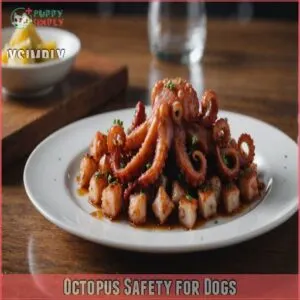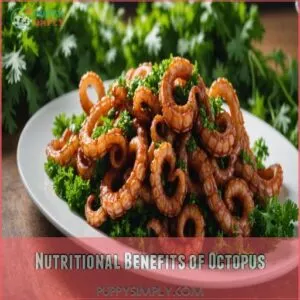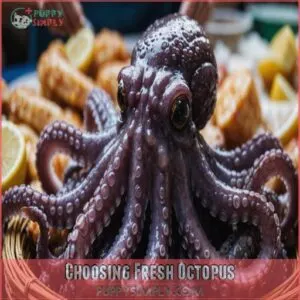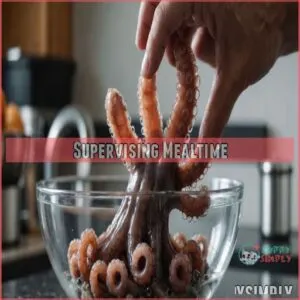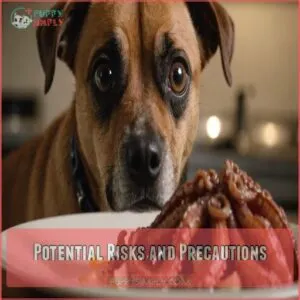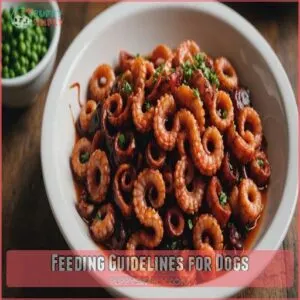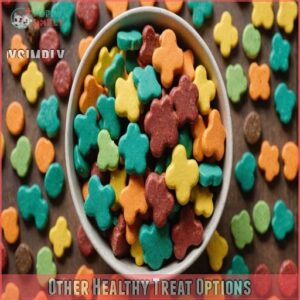This site is supported by our readers. We may earn a commission, at no cost to you, if you purchase through links.
 Yes, dogs can eat octopus, but there’s a catch – it needs to be prepared properly.
Yes, dogs can eat octopus, but there’s a catch – it needs to be prepared properly.
Think of it as a gourmet treat for your furry friend, not an everyday snack.
You’ll want to serve it cooked and unseasoned, like a canine sushi chef with safety goggles on.
Octopus can be a protein-packed powerhouse for pups, offering healthy fats and essential nutrients.
But don’t let your dog go full sea monster – moderation is key.
Raw octopus is a no-go, and those tentacles can be a choking hazard if not cut into bite-sized pieces.
Stick around to learn how to turn this eight-armed delicacy into a tail-wagging treat your dog will love.
Table Of Contents
- Key Takeaways
- Octopus Safety for Dogs
- Nutritional Benefits of Octopus
- Preparing Octopus for Dogs
- Potential Risks and Precautions
- Feeding Guidelines for Dogs
- Other Healthy Treat Options
- Signs of a Negative Reaction
- Frequently Asked Questions (FAQs)
- Can puppies eat octopus?
- Can dogs eat octopus heads?
- Is octopus poisonous to eat for dogs?
- Can dogs eat dried octopus?
- Can I give my dog cooked octopus?
- Can dogs eat squid and octopus?
- What seafood can dogs have?
- Can dogs eat mini octopuses?
- Can puppies eat octopus?
- How often can I give my dog octopus?
- Is octopus ink safe for dogs to consume?
- Can dogs eat octopus-flavored dog treats or food?
- Does octopus size affect its safety for dogs?
- Conclusion
Key Takeaways
- You can feed your dog octopus, but always make sure it’s cooked thoroughly and unseasoned to avoid harmful bacteria and excessive salt intake.
- Cut the octopus into small, bite-sized pieces to prevent choking hazards and monitor your dog as they enjoy it.
- Moderation is key; treat octopus as an occasional snack, ensuring it makes up no more than 10% of your dog’s diet.
- Keep an eye out for any allergic reactions or digestive issues when introducing octopus, and consult your vet if you spot any adverse signs.
Octopus Safety for Dogs
If you’re thinking about treating your dog to octopus, you’ll need to cook it thoroughly first to keep your furry friend safe.
You can serve this seafood delight to your pup, but make sure it’s unseasoned and cut into small, manageable pieces to prevent any tummy troubles or choking hazards.
Raw Octopus Risks
Curiosity might tempt you to offer your pup raw octopus, but it’s best to resist that urge!
Raw octopus can harbor harmful bacteria and parasites that’ll give your furry friend more than just tummy troubles.
You’re also looking at potential mercury exposure and sodium issues that could make your dog sick.
Plus, raw octopus is a major choking hazard – those tentacles aren’t exactly dog-friendly when they’re uncooked!
Cooking Methods
If you’re looking to cook octopus for your furry friend, you have a few great options!
Edamame, a nutritious and protein-rich snack, can also be served to dogs in moderation, according to Edamame for Dogs. Boiling or steaming are excellent choices that’ll make this healthy dog treat safe and tender.
If you’re feeling fancy, you can try grilling, baking, or roasting – just make sure it’s cooked through and through.
Think of it like prepping a gourmet meal for your four-legged foodie!
Keep those tentacles well-done, and you’ll be serving up a protein-packed treat your pup will go nuts for.
Seasoning Precautions
You might think a dash of seasoning makes everything better, but regarding octopus for dogs, plain is perfect!
Your furry friend’s sensitive system can’t handle the extras we humans love.
Keep it simple and skip these common culprits:
- Salt can lead to dehydration and upset tummies
- Garlic and onion are toxic no-nos that can damage red blood cells
- Spices and oils might cause digestive drama you’d rather avoid
Think of it as letting the natural flavors shine through – your pup won’t mind!
Nutritional Benefits of Octopus
You’ll be amazed by the nutritional powerhouse that octopus can be for your furry friend, packed with lean protein, healthy fats, and essential vitamins that support their overall health.
Your dog can enjoy the benefits of omega-3 fatty acids for a shiny coat, iron for energy, and phosphorus for strong bones when you serve this seafood treat in moderation.
Healthy Fats and Proteins
Looking to supercharge your pup’s protein intake?
Octopus packs a powerful punch with its lean protein content, making it an excellent addition to your dog’s diet.
You can even find tasty Dog Octopus Chew products online, such as those available at Octopus Dog Treats.
This seafood sensation delivers essential omega-3 fatty acids that’ll keep your furry friend’s coat gleaming and heart pumping strong.
Think of it as nature’s multivitamin wrapped in a chewy package – it’s the perfect alternative to traditional meat treats.
Vitamins and Minerals
Beyond being a tasty treat, octopus packs a powerful punch of essential nutrients for your furry friend.
Think of it as nature’s multivitamin wrapped in a chewy package.
Just like us, dogs need their daily dose of vitamins and minerals to stay healthy and energetic.
- Iron helps create healthy red blood cells and boosts energy levels
- Selenium strengthens the immune system and supports thyroid function
- Vitamin B12 promotes healthy digestion and nerve function
- Copper aids in collagen formation and iron absorption
Omega-3 Fatty Acids
Inside every bite of octopus, your pup’s getting nature’s brain-boosting secret weapon: omega-3 fatty acids.
These powerful nutrients work wonders for your dog’s coat, making it shine like they’ve just left the groomer’s.
But that’s not all – they’re also supporting your furry friend’s heart health, brain function, and joint flexibility.
Think of omega-3s as tiny superheroes, fighting inflammation while keeping your dog’s whole body running smoothly.
Iron and Phosphorus
While omega-3s power your pup’s brain, octopus packs another punch with its iron and phosphorus content.
These mighty minerals work together like a dream team for your dog’s health.
Iron keeps your furry friend’s energy levels soaring and helps build strong muscles, while phosphorus strengthens bones and supports nerve function.
It’s like giving your dog a natural supplement that’ll keep their tail wagging all day long!
Preparing Octopus for Dogs
You’ll want to make sure you’re preparing octopus correctly before serving it to your furry friend, as proper handling and cooking are essential for your dog’s safety.
While it might seem fancy to feed your pup octopus, you’ll be glad to know it’s actually pretty simple to prepare when you follow the right steps.
Choosing Fresh Octopus
Fresh octopus should smell like a gentle ocean breeze, not fishy or funky.
You’ll know you’ve got a winner when the flesh feels firm and springy to the touch, with a vibrant purplish-gray color that screams "I’m fresh!"
Don’t let your pup down with questionable quality – store it properly in the fridge, and use it within two days.
Trust your nose and eyes, just like your dog does!
Cutting and Serving
Now that you’ve got your octopus ready, let’s make it pup-perfect!
Cut the cooked tentacles into bite-sized pieces about the size of your dog’s kibble.
Think of it like making doggy sushi – you want chewable chunks that won’t become choking hazards.
Remove any tough bits or the beak, and you’ll have perfectly portioned pieces that’ll make your furry friend’s tail wag with delight!
Supervising Mealtime
Keeping an eye on your pup during octopus-eating time isn’t just being a helicopter parent—it’s smart safety!
Place their water bowl nearby and watch their eating speed to prevent choking.
If you’ve got multiple dogs, serve their octopus treats separately to avoid food aggression.
And here’s a pro tip: establish a regular mealtime routine that lets you monitor their enjoyment of this special seafood treat.
Potential Risks and Precautions
While octopus can be a tasty treat for your furry friend, it’s not without its risks.
You’ll want to be aware of potential mercury and sodium toxicity, allergic reactions, and choking hazards before serving up this eight-armed delicacy to your pup.
Mercury and Sodium Toxicity
While octopus can be a tasty treat, it’s important to watch out for mercury and sodium levels.
You wouldn’t want your furry friend to feel under the weather!
Here’s what you need to know:
- Raw octopus is a no-go due to higher mercury content
- Canned octopus often has too much sodium for pups
- Dried octopus can be a sodium bomb – steer clear!
- Stick to fresh, cooked octopus for a safe and healthy snack
Remember, moderation is key to keeping your dog’s tail wagging!
Allergic Reactions
Seafood allergies can turn your dog’s octopus treat into a not-so-fun surprise party.
Watch for signs like itching, sneezing, or swelling – your pup’s way of saying, "Houston, we’ve a problem."
Some breeds are more prone to shellfish sensitivities, so it’s best to start small.
Skip the raw octopus, pickled octopus, or octopus sashimi to play it safe.
Stick to well-cooked, plain octopus and keep an eye out for any fishy business.
Choking Hazards
Let’s talk about turning your dog’s octopus treat into a safe snack rather than a choking hazard.
Imagine your pup as a tiny food critic – they’ll appreciate the effort you put into preparation.
If you’re looking for convenient and safe dog octopus snacks online, start by following these simple steps to minimize risks.
Here’s how to keep mealtime fun and safe:
- Cut octopus into small, bite-sized pieces
- Cook thoroughly to soften tough texture
- Supervise your dog while they’re eating
Remember, raw or dried octopus can be chewy and dangerous.
Stick to cooked, properly sized portions to keep your furry friend’s tail wagging!
Feeding Guidelines for Dogs
You’ve decided to treat your pup to some octopus, but how much is too much?
Before serving your pet octopus, consider the safe and healthy ways other seafood like cooked salmon options are prepared for canines. Let’s explore the right way to serve this seafood delight, ensuring your furry friend enjoys it safely and reaps the nutritional benefits.
Portion Control
Now that you’re aware of the risks, let’s talk about how much octopus to serve your furry friend.
Think of it as a balancing act – you want to treat your pup without tipping the scales.
For a medium-sized dog, stick to about 3.5 oz (100 g) of cooked octopus per serving.
Remember, treats should make up no more than 10% of your dog’s daily diet.
Adjust the serving size based on your dog’s weight to keep them healthy and happy.
Frequency of Feeding
Regarding treating your pup with octopus, think "once in a blue moon."
While it’s not poisonous to dogs when cooked properly, octopus should be an occasional treat, not a daily snack.
Stick to offering it once or twice a month, tops.
Remember, every dog’s different – age and breed can affect how often they can enjoy this seafood delight.
Always cook it thoroughly, and skip the pickled or raw versions.
Monitoring Health
Vigilance is key when introducing octopus to your pup’s diet.
Keep an eye out for signs of allergies or food intolerance, like itching or tummy troubles.
Also, don’t forget to monitor your dog’s hydration levels with water alternatives for dogs.
Monitor your dog’s digestion, weight, and energy levels.
If you notice any changes, dial back on the octopus.
Remember, moderation’s the name of the game.
Octopus packs a punch with vitamin B12, copper, and phosphorus, but too much of a good thing can tip the scales.
Other Healthy Treat Options
While octopus can be a tasty treat, you’ve got plenty of other healthy options to spoil your pup.
From antioxidant-rich blueberries to crunchy carrots, there’s a world of dog-friendly snacks that’ll have your furry friend wagging for more.
Blueberries
In addition to octopus, blueberries are a fantastic treat for your furry friend.
These tiny powerhouses pack a punch of health benefits, making them a tail-wagging alternative.
You’ll love watching your pup gobble them up, and their body will thank you for the antioxidant boost.
Just remember, moderation is key – even with nature’s candy.
- Plump, juicy berries rolling around in your dog’s bowl
- A curious nose sniffing the sweet aroma
- Tiny blue stains on a happy, drooling muzzle
- Paw prints leading to the fridge, begging for more
- A content pup napping after their berry snack
Carrots
Crunchy and nutritious, carrots are a fantastic snack for your furry friend.
They’re packed with fiber and beta-carotene, supporting digestion and overall health.
You can serve them raw or lightly steamed, cut into bite-sized pieces to prevent choking.
As a low-calorie treat, carrots are perfect for pups watching their waistline.
Just remember, moderation is key – too many might turn your pooch into a little orange bunny!
Apples
For a fruit treat for your furry friend, apples are a core choice.
They’re packed with fiber and vitamins, making them a healthy snack.
Just remember, not all parts of the apple are dog-friendly.
You can also try making some homemade dog treats with rolled oats for a tasty and nutritious alternative.
Here’s what you need to know:
- Apple slices are safe and crunchy treats
- Remove the apple core and seeds, as they contain cyanide
- Moderate apple treats to avoid tummy troubles
Offer small apple pieces as a rewarding snack.
Your pup will be barking for more of these sweet, nutritious bites!
Cantaloupe
Your dog’s sweet tooth might be calling for cantaloupe!
This juicy treat is packed with fiber, vitamins, and beta-carotene.
But hold your horses – don’t go melon-crazy just yet.
While cantaloupe benefits dogs, it’s high in sugar.
Stick to small serving sizes, about a few cubes.
Remove seeds and rind to avoid choking hazards.
Mix it up with other fruits for a puppy parfait that’ll have tails wagging!
Celery
While cantaloupe’s sweetness might steal the show, celery quietly waits in the wings as a great treat for your pup.
This crunchy veggie packs a punch with its health benefits for dogs, much like how raw fish bones, such as those from smelt or mackerel chunks, can be a nutritious addition to their diet. This crunchy veggie packs a punch with its health benefits for dogs.
It’s low in calories but high in fiber, making it great for digestion.
Plus, celery’s natural crunch can help clean your dog’s teeth.
- Picture Fido crunching away, tail wagging with delight
- Imagine fresh breath after a celery snack – bye-bye doggy breath!
- Envision a happy tummy, thanks to celery’s digestive perks
Signs of a Negative Reaction
Despite the best intentions, sometimes our furry friends don’t react well to new treats.
Keep an eye out for these signs after feeding your dog octopus: Persistent diarrhea in dogs can be a major red flag, especially if it’s accompanied by vomiting or lethargy.
If your pup starts doing the ‘post-meal shuffle‘ – you know, that awkward dance of discomfort – it’s time to play detective. Watch for excessive licking, sneezing, or scratchy behavior. These could be your dog’s way of saying, "Houston, we’ve a problem!" Don’t ignore belching or face swelling either; they’re not just party tricks gone wrong.
If you spot any of these red flags, it’s best to put octopus on the ‘maybe later’ list and have a chat with your vet. Better safe than sorry, right?
| Warning Signs | What to Do |
|---|---|
| Vomiting or Diarrhea | Stop feeding octopus, offer water |
| Itching or Swelling | Contact your vet immediately |
| General Unease | Monitor closely, limit food intake |
Frequently Asked Questions (FAQs)
Can puppies eat octopus?
Puppies can eat octopus, but it’s very important to cook it thoroughly and serve only small, unseasoned pieces.
Puppy tummies are delicate, so keep an eye out for any odd reactions.
Always consult your vet with concerns.
Can dogs eat octopus heads?
Yes, dogs can eat octopus heads if they’re cooked, unseasoned, and without hard parts like the beak.
Make sure it’s cut into small pieces to prevent choking.
Always feed octopus in moderation as an occasional treat, not a meal.
Is octopus poisonous to eat for dogs?
Octopus isn’t poisonous to dogs, but serve it cooked and unseasoned to keep them safe.
Raw octopus harbors harmful germs, and seasoning adds unnecessary risks.
Always supervise meals to avoid choking and serve it as an occasional treat.
Can dogs eat dried octopus?
Imagine your dog’s delight!
No, dried octopus isn’t ideal; it’s often loaded with salt, which can be harmful.
Stick to cooked, plain octopus in small portions for a yummy, safe treat.
Can I give my dog cooked octopus?
You can treat your dog to cooked octopus, as long as it’s thoroughly prepared without any seasonings.
Just cut it into small, bite-sized pieces.
Keep an eye on your pup to make sure they don’t choke.
Can dogs eat squid and octopus?
A whopping 90% of seafood is safe for dogs if cooked right.
Feed your dog cooked squid and octopus without seasonings.
Avoid raw seafood, which carries bacteria.
Serve in moderation and watch for any allergies or reactions.
What seafood can dogs have?
Dogs can safely enjoy certain seafood like cooked octopus, shrimp, and scallops when prepared without seasonings.
Avoid raw or undercooked options, as they might harbor harmful bacteria.
Always serve seafood in moderation to prevent dietary imbalances.
Can dogs eat mini octopuses?
Mini octopuses are safe for your dog if cooked without seasoning.
Make sure they’re well-done to avoid harmful bacteria.
Cut into tiny pieces to prevent choking, and remember to limit portions since treats shouldn’t replace their diet.
Can puppies eat octopus?
Octopus, cooked thoroughly and served plain, can be safe for puppies in small amounts.
However, proceed with caution due to potential allergies and digestive issues.
Always introduce new foods slowly and consult your vet to be safe.
How often can I give my dog octopus?
You can treat your dog to cooked octopus occasionally, but not more than once a week.
Make sure it’s well-cooked and unseasoned, and keep portions small to avoid digestive issues and maintain a balanced diet.
Is octopus ink safe for dogs to consume?
It’s a culinary crime scene!
Octopus ink isn’t toxic, but it’s not exactly a superfood either.
Avoid it; there are much better, safer treats out there for your pup.
Stick to the approved list for a happy, healthy dog.
Can dogs eat octopus-flavored dog treats or food?
While octopus-flavored dog treats might seem tempting, it’s important to make sure that they’re low in sodium and free from harmful additives.
Always check labels, and when in doubt, consult with your vet before introducing new flavors.
Does octopus size affect its safety for dogs?
The octopus’s size doesn’t directly affect safety for dogs.
What’s important is cooking, removing hard parts, and cutting into small pieces.
Think of it like chopping veggies for a stew—safety makes sure a tasty treat, not trouble!
Conclusion
Like a seasoned mariner steering clear of storms, knowing how to safely prepare octopus for your dog makes for smooth sailing at mealtime.
Dogs can eat octopus, but be sure it’s cooked and unseasoned, served in moderation, and cut into bite-sized pieces.
Watch for any adverse reactions while enjoying the health benefits like proteins and omega-3s this treat offers.
Your pup will thank you with extra wagging tails, making your efforts truly rewarding.

